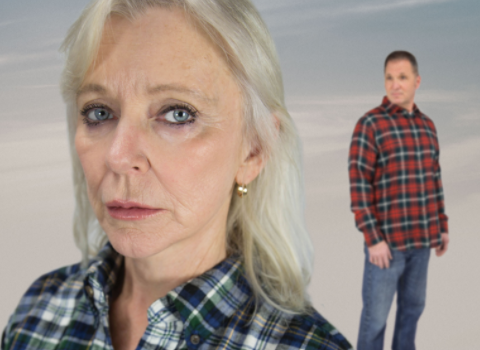
Little ditty ’bout Sara & John
You know what it’s like when everybody in the family gets sick at the same time? Nobody’s able to make soup, or Jello, and somebody’s always in the bathroom when you really need to go, and nobody can seem to be nice to anybody for very long, even when everybody’s sympathetic? Other People’s Happiness is a little like that. It’s a well made play about a tightly knit family of four who all come down with relationship flu at the same time. Some of the drama feels artificial — manufactured by characters who court it — but there’s some real stuff too in this latest NewWorks@TheWorks-winning world premier. It’s a handsom thing too.
Like most well made plays Other People’s Happiness begins fairly late in an ongoing story, and the first stretch is devoted to much exposition. This one starts on a family fishing vacation, with an occasionally interrupted monologue by John. He’s a reasonably successful businessman and father of two, who’s casting around for more than the evening meal. John drops his fishing line again and again without success, while talking about the new phase he and his wife Sara are entering. Maybe it’s time to relax and try new things. Maybe they can spice things up too with some erotic adventures. But Sara has a completely different future in mind, whether she’s willing to be honest about it or not. Words are spoken, mean things are done. Stupid things too.
Did you catch the metaphors? I figured. More complications (and metaphors) arise when the couple’s adult son and daughter, who are experiencing rocky patches of their own, get involved. The details make the show, so I’ll say one more thing and stop at that. There’s a twist that comes near the end of the show. In a well made play there’s almost always a twist that reverses much of what the characters think they know about everything.
Jeanna Juleson is a terrific Sara, reserved on top but with so much more going on just below the surface. After all these years she’s still something of a mystery to her husband, and that’s only mostly his fault. Gordon Ginsberg’s John is appropriately bland, working harder than his wife to maintain a veneer of reason and control while completely losing his shit. Jacquelyn Skoog Hayner and Standrew Parker are the kids and they both bring a lot of dimension to characters that are sometimes more functional than fully baked.
Living Colors: ‘Other People’s Happiness’ is a Well Made Play
Like a New Yorker Cartoonist, playwright Adam Seidel has a fine sense of economy. He ably builds people we recognize, and circumstances we know too well, with only a few scribbles and scrawls. And like old masters of the well made play he makes great use of letters and notes. Or, in this case, smart phones. So many big events happen offstage and are explained in scenes where the kids meet up to catch up, or while John gives a tour of the barn he’s decided to rehabilitate and repurpose. It sometimes makes for a play that’s more talky than active. When somebody sets fire to the family home conversations about the blaze need to pulse with the heat and horror of memories and dreams fighting to stay alive. What we get is more and more squabbling between characters who are so bland they’re almost fascinating.
New plays are usually born in an austerity that fosters marvelous invention. But a professionally mounted show is one of the real perks of POTS’ competition, and it’s a nice one. Veteran performer/first time director Leah Bray Nichols hasn’t gone out on any limbs, and with a straightforward piece like Other People’s Happiness, that’s probably for the best. She’s shown a keen sense for what’s necessary, and gotten honest, believable performances from a generous cast. But artistry is another metaphor in Other People’s Happiness and the real stars of the show are Jackie Nichols’ blank canvas set and Mandy Heath’s gorgeous, painterly lighting design. Heath isolates her figures in space and makes them glow against rich, jewel tone landscapes of color that sometimes make up for an absence of color in the writing. The lights are a big bold choice in a play plays it safe and could benefit from more bold choices.
New plays are the lifeblood of live theater, and Playhouse on the Square’s New Works series, now in its third production season, has been a magnet for solid material like We Live Here, and the excellent Byhalia, Mississippi. Like most of what we’ve seen so far from the series, Other People’s Happiness is intriguing, with real potential to become something much better with a draft or two. On many occasions I’ve made the point that not everything needs to be a masterpiece, the theater needs more good plays appealing to all kinds of consumers. Other People’s Happiness is already a good play, and it connects, judging by the mostly enthusiastic response of a packed Saturday night house. It’s also a little familiar — currently lacking the unique identity and defining moments that make for really memorable theater. Leah Nichols’ clean composition and Heath’s saturated colors make it memorable anyway.